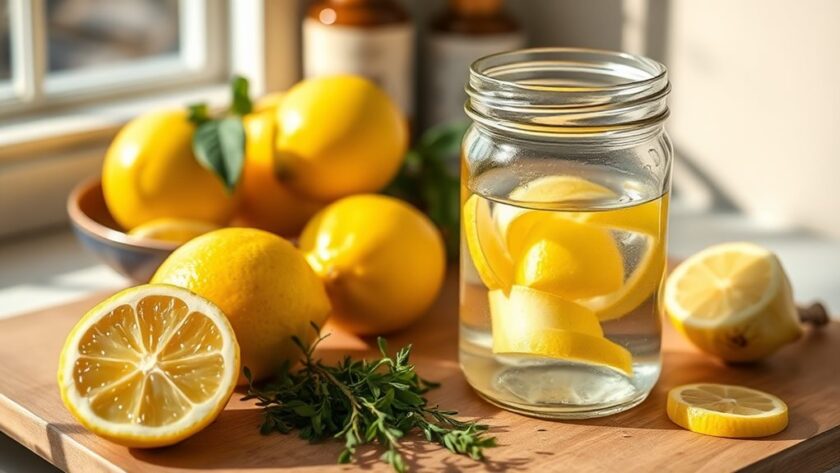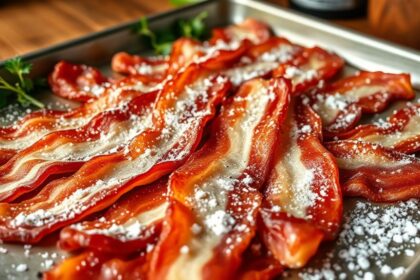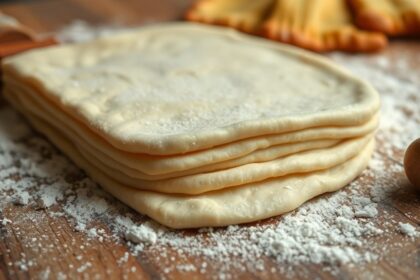Making homemade lemon extract is simple and rewarding. Start by washing five organic lemons and zesting them, avoiding the white pith. Place around 1/4 cup of the zest into a sterilized jar and pour in 1.5 cups of high-proof vodka, ensuring the zest's fully submerged. Seal it tightly and store in a cool, dark place. Shake it gently once a week for 4-6 weeks to boost flavor extraction. You'll know it's ready when the vodka turns amber. This extract perks up baked goods, drinks, and more. Keep going, and you'll discover tips and uses to elevate your culinary experience.
Overview of Homemade Lemon Extract
Making homemade lemon extract is a simple and rewarding process that not only saves you money but also allows you to control the flavor and quality of your ingredients. Instead of spending around $45 for commercial extracts, you can create your own for about $5.88 for 12 ounces.
The beauty of this DIY project lies in the infusion process, which takes approximately 4-6 weeks. During this time, the vibrant lemon peels impart a bright yellow color and zesty flavor to the quality vodka you use. Additionally, this extract can elevate a variety of desserts, enhancing treats like Norwegian Kransekake with its bright citrus notes.
Using fresh organic lemons is essential for achieving the best taste, so be sure to carefully zest them while avoiding the bitter white pith. One of the perks of homemade lemon extract is its long shelf life; when stored in a cool, dark place, it can last indefinitely, often exceeding two years.
This versatility makes it an excellent addition to a variety of culinary creations, from baked goods to dressings and beverages. By making your own extract, you not only enhance your dishes but also enjoy the satisfaction of crafting something unique and flavorful.
Ingredients and Tools Needed
Creating your homemade lemon extract requires a few key ingredients and tools to guarantee a successful infusion. First, you'll need five medium organic lemons. Their flavorful zest is essential for capturing that vibrant lemon essence in your extract, much like how the ancient Greeks used local ingredients to create their early cheesecake versions.
Next, choose a high-proof alcohol, like vodka, with at least 80% proof to effectively extract the oils and flavors.
For zesting the lemons, a ribbon zester or microplane is your best bet, ensuring you get just the zest without the bitter pith. You'll also need a sterilized glass jar or bottle to store your lemon extract once it's ready. A funnel will make pouring the infused liquid into the jar much easier, minimizing mess.
After the infusion process, it's helpful to have cheesecloth or a fine mesh strainer on hand to filter out any solid remnants, ensuring a smooth extract.
If you plan on gifting your homemade lemon extract, consider adding some decorative touches like gold sealing wax, ribbons, or gift tags. These optional items can really enhance the presentation, making your thoughtful gift even more special.
With these ingredients and tools, you're all set to create delicious lemon extract!
Preparation Steps
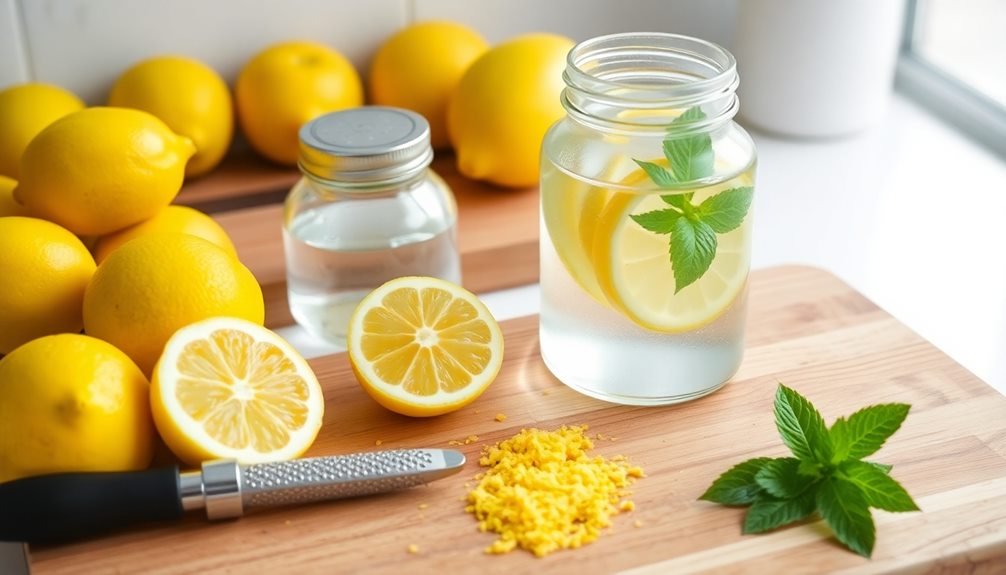
To prepare your homemade lemon extract, start by thoroughly washing the lemons to eliminate any pesticides. If they're non-organic, use a baking soda solution for extra cleaning.
Once they're clean, grab a microplane or zester and carefully remove the yellow zest from the lemons, taking care to avoid the bitter white pith, as it can negatively impact the flavor. Using fresh ingredients adds a vibrant taste, much like how nutty ingredients enhance flavor in healthy baking.
Next, place 1/4 cup of the freshly zested lemon peel into a sterilized glass jar or bottle. Make sure the jar is clean and dry to prevent any contamination.
After that, pour in 1.5 cups of high-proof vodka, ensuring the zest is fully submerged. This step is essential for ideal flavor extraction, so seal the container tightly to prevent evaporation.
Store the jar in a cool, dark place. For the best results, shake it gently once a week to enhance the extraction process.
Over the next 4-6 weeks, your homemade lemon extract will develop a vibrant flavor, ready to elevate your culinary creations. Enjoy the process and the delightful aroma that fills your space!
Selecting and Preparing Lemons
Choosing the right lemons is vital for crafting a flavorful homemade lemon extract. Whenever possible, opt for organic lemons, as they're free from harmful pesticides and chemicals, which enhances the quality of your extract. If you can't find organic lemons, don't worry—just wash your non-organic lemons in a solution of water and 2 teaspoons of baking soda for about 15 minutes. This effectively removes pesticide residues.
Just as chocolate chip cookies have evolved over time with various adaptations, the quality of your ingredients can greatly influence the final product. Fresh lemons, in particular, can greatly impact the flavor profile of your extract, reminiscent of how chocolate chip cookies became a beloved dessert across the nation.
After soaking, rinse the lemons thoroughly to verify no baking soda remains, and allow them to dry completely. Freshness plays an essential role in the flavor quality, so select firm, brightly colored lemons that have a fragrant aroma.
When you're ready to zest the lemons, focus on removing only the yellow outer rind. Avoid the bitter white pith, as it can negatively affect the flavor of your lemon extract.
Extraction Process
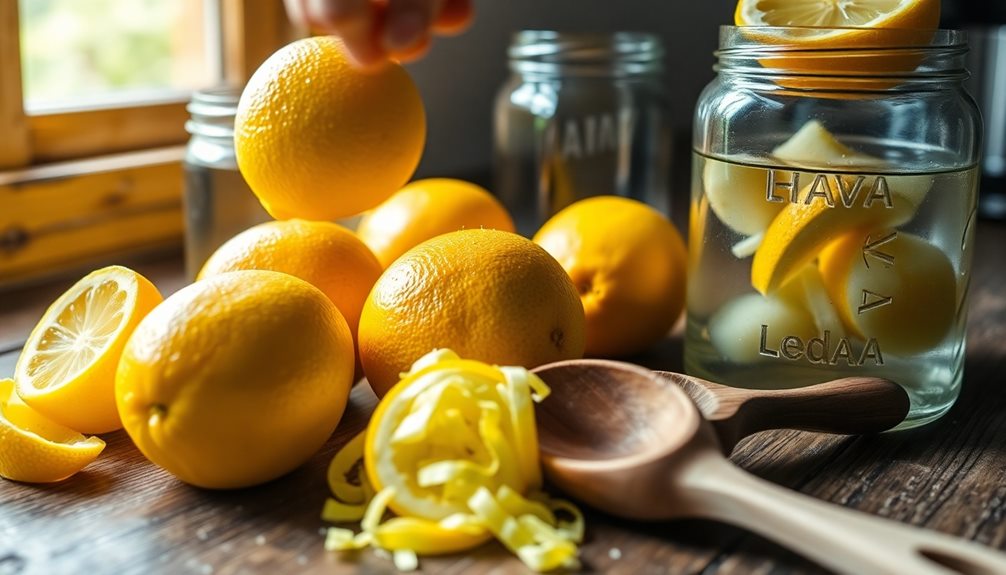
To extract the best flavors from your lemon zest, you'll need to let it infuse in vodka for about 4-6 weeks.
Remember to shake the jar gently each week; this helps with flavor distribution and enhances the extraction process.
Keep an eye on the color, as a vibrant yellow shows progress, while an amber hue indicates ideal flavor development.
Ideal Infusion Time
When making homemade lemon extract, the ideal infusion time is crucial for achieving a rich, vibrant flavor. Aim for approximately 4 to 6 weeks for the best results. This duration allows the flavors to fully develop and the color to transform into a bright amber hue.
The longer you let it infuse, the more intense the flavor extraction will be, as the high-proof vodka effectively draws out the essential oils from the lemon peels.
During this infusion time, it's a good idea to gently shake the jar once a week. This action helps enhance the extraction process and guarantees that the flavors distribute evenly throughout the mixture.
As you monitor the extract, look for that vibrant yellow color; it's a sign that the flavors are intensifying and the infusion is progressing well.
Once the infusion period is over, you can strain out the lemon peels, but don't worry if you leave them in. They won't negatively impact the flavor and can even contribute additional notes over time.
Enjoy your homemade lemon extract in various recipes, knowing you've created something truly special!
Shaking for Flavor
Gently shaking the jar of lemon zest and vodka once a week significantly boosts the extraction process, guaranteeing a well-rounded flavor. This simple action plays an essential role in the infusion process, helping the vodka effectively extract the vital oils and flavors from the lemon zest.
By mixing the ingredients regularly, you promote even flavor distribution, resulting in a more balanced and aromatic extract.
During the typical infusion period of 4 to 6 weeks, find a cool, dark place to store your jar. This environment optimizes flavor development, but remember that consistent shaking is important. Each time you shake the jar, you encourage the vodka to penetrate the zest, drawing out those vibrant citrus notes.
While you might be tempted to check on your mixture frequently, aim to stick to your weekly shaking routine. This discipline will enhance the overall flavor and make sure your lemon extract is nothing short of delightful.
After the infusion period, you can strain out the lemon peels, but leaving them in the vodka will continue to deepen the flavor over time, making your homemade lemon extract even more versatile for future culinary creations.
Color Change Indicators
As you continue shaking the jar weekly, you'll notice an exciting transformation in the vodka's color. These color change indicators are key to knowing your lemon extract is infusing properly.
Within the first few weeks, watch as the vodka turns a vibrant yellow, signaling that the lemon zest is releasing its essential oils.
- After 4-6 weeks, expect an amber hue, which means the flavors have intensified, and your extraction is nearing completion.
- Regular shaking helps distribute the oils, enhancing the vibrant liquid's color.
- If you see cloudiness, it might be due to D-Limonene, a natural compound in the lemon peel.
To achieve the best results, strain the mixture through cheesecloth to remove solids and retain the beautiful, clear extract.
This final step not only improves clarity but guarantees that you have a vibrant liquid ready for your recipes.
Keep an eye on these color changes; they're essential indicators of your progress throughout the extraction process.
Enjoy the journey of creating your homemade lemon extract!
Storage and Shelf Life
Storing homemade lemon extract properly guarantees it maintains its quality for an extended period. Thanks to the preserving qualities of vodka, your extract can last indefinitely, with a shelf life that can exceed two years if you take care of it.
The historical evolution of culinary techniques, much like the evolution of crème brûlée's ingredients, showcases the importance of proper storage in preserving flavors. To guarantee the best results, always store lemon extract in dark glass bottles. This minimizes exposure to light and heat, both of which can degrade the quality over time.
You might notice some cloudiness in your extract, which is due to D-Limonene, a natural component of lemon peel. Using high-proof alcohol can help reduce this cloudiness in future batches.
It's also a good idea to label your lemon extract with the date of preparation. This way, you can keep track of its age and guarantee peak freshness when you decide to use it in your recipes.
The extract retains its flavor and quality even with the lemon peels left in the vodka, allowing for continued flavor infusion without any adverse effects.
Uses for Lemon Extract
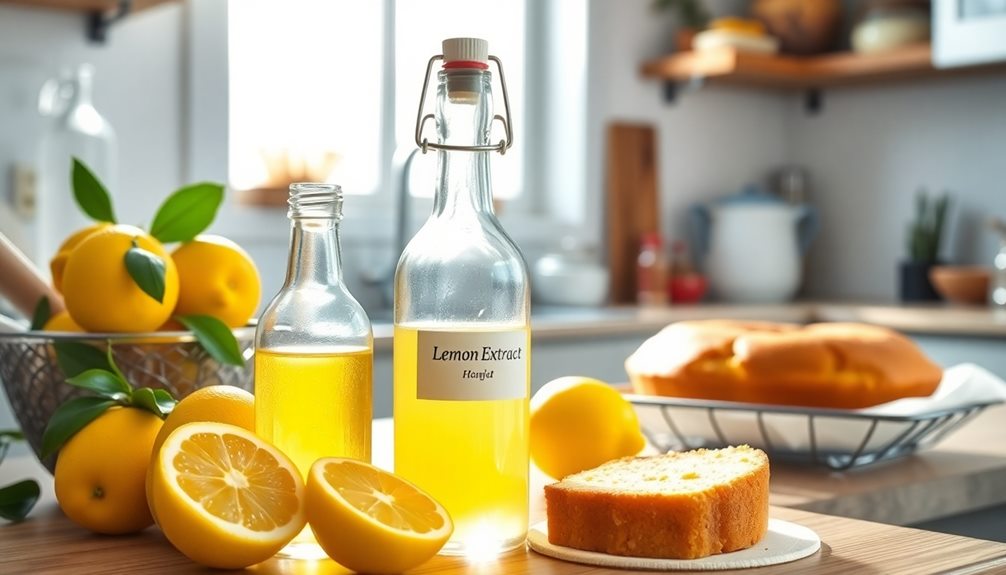
Lemon extract's vibrant flavor can transform your cooking and baking, making it a must-have in your pantry. For those who enjoy festive treats, consider using lemon extract in your holiday baking alongside unique vegan cookie recipes like Vegan Cranberry Orange Pinwheel Cookies, which combine invigorating citrus notes with festive flair.
Whether you're whipping up a batch of cookies or creating a revitalizing salad dressing, the uses for lemon extract are endless. Here are a few ways to incorporate it into your culinary adventures:
- Baked Goods: Use lemon extract to enhance cakes, cookies, and muffins with a bright citrus note.
- Savory Dishes: Add it to marinades and salad dressings for an unexpected burst of flavor.
- Beverages: Flavor your cocktails, lemonades, and teas for an exhilarating twist.
When you make homemade lemon extract, you'll discover how just a small amount can elevate sauces and soups, adding depth to your meals.
Plus, it isn't just for cooking. You can even incorporate lemon extract into homemade beauty products like scrubs, taking advantage of its delightful scent and potential skin benefits.
With so many uses for lemon extract, you'll wonder how you ever cooked without it!
Variations and Alternatives
You can easily switch things up by using other citrus fruits like oranges and limes to create unique flavor variations.
For a delightful twist, consider incorporating the nutty undertones of almond extract, which can enhance the overall flavor profile of your homemade extract a sophisticated dessert option.
If you're looking for a non-alcoholic option, try using food-grade glycerin instead of vodka, though it'll take longer to infuse.
Get creative by adding ingredients like vanilla beans or herbs to enhance your extract's flavor profile.
Citrus Flavor Variations
Exploring citrus flavor variations opens up a world of culinary possibilities. You can easily elevate your homemade extracts by experimenting with different citrus fruits, each bringing its unique taste to your dishes.
- Use a citrus zester to get the most flavor from your fruits.
- Combine extracts for exciting flavor pairings.
- Try infusing with herbs for a revitalizing twist.
Besides lemons, oranges, limes, and grapefruits are fantastic alternatives. Each offers distinct aromas and flavors, perfect for various culinary applications.
If you're feeling adventurous, consider combining lemon zest with vanilla beans or fresh herbs; these flavor pairings can greatly enhance your extract's complexity.
Making citrus extracts isn't just about the fruit; it's also about the infusion time. For instance, orange zest may need about 4-6 weeks, much like lemon zest, while other fruits may vary.
You can also experiment by adding sugar or honey to create a limoncello-like sweetness in your extract.
Non-Alcoholic Extract Options
For those seeking alternatives to traditional alcohol-based extracts, non-alcoholic options like glycerin-based lemon extract can be a game-changer.
Making this extract is simple and perfect for anyone avoiding alcohol. Start by using a ratio of 1 part lemon zest to 2 parts food-grade glycerin. Make sure the lemon zest is fully submerged in the glycerin for the best flavor infusion.
The extraction process resembles that of alcohol. Place the jar in a cool, dark spot, and shake it periodically to encourage ideal flavor development. Keep in mind that glycerin-based extracts require a longer infusion time of about 8-12 weeks, so patience is key.
While glycerin may impart a slightly different flavor profile compared to alcohol extracts, it brings a unique sweetness that can enhance your recipes beautifully.
Whether you're baking or cooking, this non-alcoholic extract is suitable for all dietary preferences. It's a fantastic way to enjoy the bright taste of lemon without the alcohol, making your culinary creations even more inclusive.
Creative Ingredient Combinations
While traditional lemon extract offers a bright, zesty flavor, enhancing it with creative ingredient combinations can elevate your culinary experience. Here are a few ideas to inspire your next batch:
- Vanilla and Lemon Fusion: Add vanilla beans to your lemon extract for a delightful citrus-vanilla combination that enriches your baking and cooking.
- Citrus Medley: Experiment with other citrus peels, like oranges or limes, to create unique extracts that complement a variety of recipes and beverages.
- Herb-Inspired Infusions: Incorporate fragrant herbs like thyme or mint along with lemon peel to infuse your extract with additional aromatic qualities.
If you want a sweeter twist, mix in a cup of sugar with the vodka, transforming your lemon extract into a limoncello-like treat.
For those looking to avoid alcohol, try using food-grade glycerin instead, though it'll require a longer infusion time of 8-12 weeks for peak flavor extraction.
With your lemon zester in hand, get creative and enjoy the process of crafting your own homemade vanilla and lemon extracts!
Tips for Success
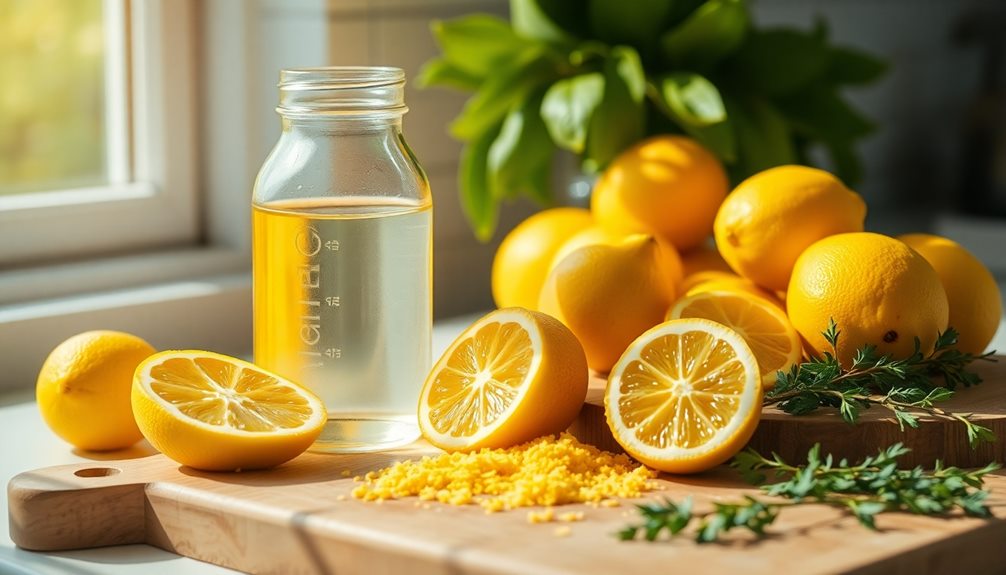
Creating a flavorful homemade lemon extract requires attention to detail and a few key tips for success. Start by zesting only the bright yellow outer skin of the lemons; avoid the white pith, as it can lead to bitterness and negatively impact your extract's flavor.
For the best results, use high-proof vodka (at least 80 proof). This not only extracts the essential oils from the lemon zest effectively but also helps preserve the quality of your extract over time. You can enhance the nutritional profile of your baked goods by incorporating healthy fat swaps like avocado oil, which can complement the bright flavors of lemon in your baking.
During the infusion process, make it a habit to gently shake the jar once a week. This action enhances flavor extraction and guarantees the lemon oils distribute evenly throughout the vodka.
To protect your homemade extract from light exposure, store it in a dark glass bottle. Light can degrade its quality and flavor, so this step is vital.
Savings Analysis
Homemade lemon extract not only offers a burst of flavor but also delivers impressive savings compared to store-bought options. When you make your own, you can enjoy the following benefits:
- Significant cost reduction: Store-bought lemon extract averages $3.76 per ounce, while homemade costs just $5.88 for 12 ounces. Additionally, using homemade ingredients allows for a more health-conscious choice, similar to the benefits of opting for healthier ingredients in gluten-free baking.
- Economical ingredients: With vodka priced at around $0.49 per ounce and organic lemon peels often considered free, you're maximizing savings.
- Long-term financial benefits: Store-bought options can total up to $45.12, whereas your homemade extract only sets you back $5.88.
Conclusion
Making your own lemon extract is like capturing summer's sunshine in a bottle. With just a few simple ingredients and steps, you're not only enhancing your culinary creations but also embracing the joy of DIY. Whether you're adding a splash to your favorite dessert or elevating savory dishes, this homemade gem brings a burst of flavor that store-bought options can't match. So, roll up your sleeves, and let your kitchen become a fragrant haven of lemony goodness!

